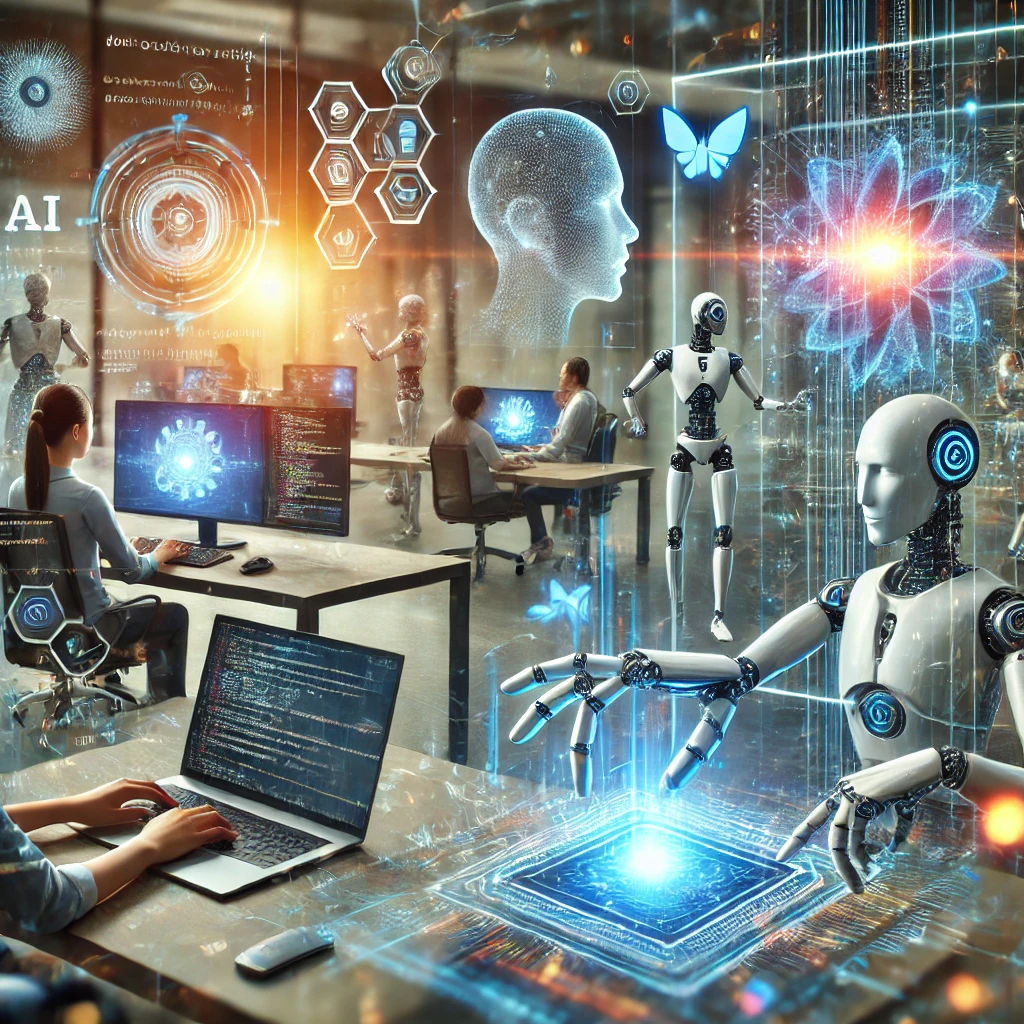Website designed with the B12 website builder. Create your own website today.
Start for free
In recent years, Artificial Intelligence (AI) has made groundbreaking strides in transforming industries, and coding is no exception. Companies across various sectors are leveraging AI to streamline software development, enhance productivity, and reduce errors in coding. This article explores how AI is used in coding, its benefits, and its impact on the software development lifecycle.
---
### **1. The Role of AI in Coding**
AI has become an indispensable tool in coding, simplifying complex tasks and enabling developers to focus on innovative problem-solving. It acts as a catalyst in automating repetitive tasks, offering intelligent code suggestions, and improving code quality.
#### **Key Functions of AI in Coding**
- **Code Generation**: AI-powered tools can write code snippets or even entire programs based on specific requirements.
- **Bug Detection**: AI systems analyze code for errors, potential vulnerabilities, and inefficiencies.
- **Code Optimization**: AI suggests ways to improve performance by rewriting or optimizing existing code.
- **Natural Language Processing (NLP)**: AI translates human language into code, enabling non-programmers to contribute to software development.
---
### **2. AI Tools and Technologies in Coding**
Several AI-driven tools and platforms are widely used by companies to enhance coding processes:
#### **a. GitHub Copilot**
Developed by GitHub in collaboration with OpenAI, Copilot is an AI-powered coding assistant that provides intelligent code suggestions as developers type.
Learn more: [GitHub Copilot](https://github.com/features/copilot)
b. Kite**
Kite uses AI to offer real-time code completions and documentation. It integrates seamlessly with popular IDEs (Integrated Development Environments) like Visual Studio Code and PyCharm.
Learn more: [Kite](https://www.kite.com)
#### **c. TabNine**
TabNine is another AI code completion tool that supports multiple programming languages. It uses machine learning models to predict and complete code snippets.
Learn more: [TabNine](https://www.tabnine.com)
#### **d. DeepCode**
DeepCode leverages AI to review codebases and detect potential bugs or vulnerabilities. It helps maintain high code quality and compliance with best practices.
Learn more: [DeepCode](https://www.deepcode.ai)
#### **e. OpenAI Codex**
Codex is the engine behind GitHub Copilot. It can convert natural language into code and supports numerous programming languages, making it a versatile tool for developers.
Learn more: [OpenAI Codex](https://openai.com/research/codex)
---
### **3. Applications of AI in Software Development**
#### **a. Automated Code Generation**
AI tools can generate boilerplate code or complete functional blocks, reducing the time developers spend on repetitive tasks. For example, OpenAI Codex can create web pages or algorithms based on user inputs.
#### **b. Bug Detection and Fixing**
AI algorithms scan millions of lines of code to detect bugs and suggest fixes. This not only saves time but also minimizes the chances of critical errors in production.
#### **c. Testing and Debugging**
AI enhances software testing by automating test case generation and execution. It also identifies patterns in recurring bugs, enabling developers to resolve issues proactively.
#### **d. Code Review and Collaboration**
AI tools analyze code during the review process, providing constructive feedback and ensuring adherence to coding standards. This improves team collaboration and speeds up the development cycle.
#### **e. Learning and Skill Enhancement**
AI-powered platforms offer learning resources and tutorials tailored to a developer's skill level, helping them stay updated with the latest technologies and best practices.
---
### **4. Benefits of Using AI in Coding**
#### **a. Enhanced Productivity**
AI automates mundane tasks, allowing developers to focus on creative and strategic aspects of software development. This boosts overall productivity and accelerates project timelines.
#### **b. Improved Code Quality**
By identifying bugs, inefficiencies, and vulnerabilities early, AI ensures high-quality code and reduces technical debt.
#### **c. Cost Efficiency**
AI reduces the need for extensive manual testing and debugging, saving resources and lowering development costs. **d. Democratization of Coding**
Democratization of Coding**
With AI tools translating natural language into code, non-technical professionals can contribute to software projects, bridging the gap between technical and non-technical teams.
#### **e. Faster Time-to-Market**
AI shortens the software development lifecycle, enabling companies to bring products to market faster and respond swiftly to changing customer needs.
---
### **5. Challenges and Considerations**
While AI offers numerous benefits, there are challenges companies need to address:
- **Accuracy of Suggestions**: AI tools may not always provide optimal solutions, requiring manual intervention.
- **Dependency**: Over-reliance on AI can limit a developer’s ability to solve complex problems independently.
- **Ethical Concerns**: Using AI-generated code raises questions about intellectual property and accountability.
- **Integration with Legacy Systems**: Adapting AI tools to work with older codebases can be complex and time-consuming.
---
### **6. Future of AI in Coding**
The integration of AI into coding is still in its early stages, but its potential is immense. Future advancements could include:
- **Self-Healing Code**: AI systems that autonomously detect and fix issues in real-time.
- **Fully Automated Development**: Tools that create entire applications based on high-level requirements.
- **Enhanced Collaboration**: AI facilitating seamless collaboration between global development teams.
- **Greater Accessibility**: More intuitive interfaces enabling individuals with minimal technical knowledge to build software.
---
### **Conclusion**
AI is revolutionizing coding by automating repetitive tasks, enhancing code quality, and making software development more accessible. Companies leveraging AI tools are not only improving efficiency but also redefining how software is created and maintained. While challenges remain, the future of AI in coding promises unprecedented innovation and possibilities, making it an essential ally for developers and businesses alike.
By adopting AI technologies, companies can stay ahead of the curve and ensure their software development processes remain competitive and efficient in the evolving tech landscape.